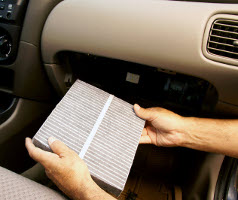 The cabin air filter is a filter that is placed in the vehicles ventilation system to remove pollutants from the air before they enter the passenger compartment. Cabin air filters can also be called pollen or dust filters, interior ventilation filters, ACC filters, or passenger compartment filters. Since cabin air filters are a fairly recent addition to automobile equipment, this filter can often be overlooked. The cabin air filter purifies the air as well as protecting the heater and air conditioning components. If your filter becomes dirty or clogged it can greatly reduce the effectiveness of the vehicle’s air conditioning and heating performance and significantly reduce air flow from the cabin vents. You might also notice unpleasant odors coming from the cabin vents. The recommendations for replacing this filter are at least once a year or every 12,000 to 15,000 miles. It should be replaced more often if your car is driven in areas with heavy pollution or dusty conditions.
The cabin air filter is a filter that is placed in the vehicles ventilation system to remove pollutants from the air before they enter the passenger compartment. Cabin air filters can also be called pollen or dust filters, interior ventilation filters, ACC filters, or passenger compartment filters. Since cabin air filters are a fairly recent addition to automobile equipment, this filter can often be overlooked. The cabin air filter purifies the air as well as protecting the heater and air conditioning components. If your filter becomes dirty or clogged it can greatly reduce the effectiveness of the vehicle’s air conditioning and heating performance and significantly reduce air flow from the cabin vents. You might also notice unpleasant odors coming from the cabin vents. The recommendations for replacing this filter are at least once a year or every 12,000 to 15,000 miles. It should be replaced more often if your car is driven in areas with heavy pollution or dusty conditions.
There are two types of filters that are offered for replacement, a single stage filter and a multi-stage filter. Single stage filters trap dust, large soot, and allergens. Multi-stage filters use activated carbon that reduces toxic gases and odors as well as dust and allergens. Multi-stage filters are usually recommended more often because of their higher quality.
Since this filter is a relatively new feature, not all vehicles have them. If your car is a 2000 or newer, it probably has a cabin air filter. Cars and trucks in the U.S. started using cabin air filters around 1995, so if you aren’t sure whether you have one or not, check your owner’s manual or talk to your repair technician. Most repair technicians should be able to tell you whether or not your car has one. The ease or difficulty of replacing the filter depends on the make and model of your vehicle. There might be some models that would be a lot less trouble to have an auto repair technician replace it , rather than trying to replace the filter on your own.

Leave a Reply
You must be logged in to post a comment.